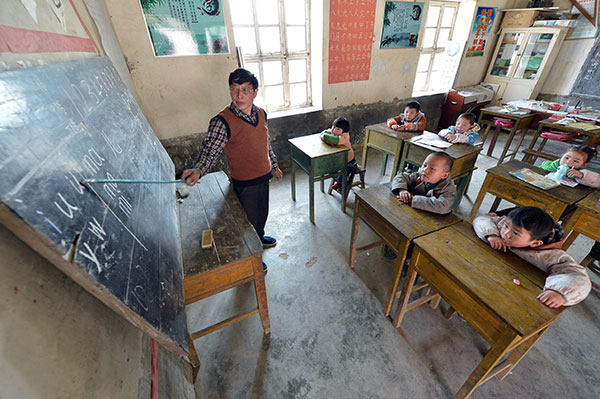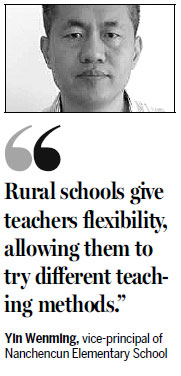|
 Dong Chaobing teaches a Chinese class in a village school in Baokang county, Hubei province, in March. The 59-year-old is the only teacher at the school. Yang Tao / for China Daily |
Yin Wenming, the vice-principal of Nanchencun Elementary School in a rural village of Hebei province, has worked at the school for nearly 20 years, despite having the chance to work in an urban school.
In fact, after working in both urban and rural schools, the 41-year-old Yin chose to return to the rural school to pursue his education dream.
The story of Yin reflects the lives of many of China's 3.3 million rural teachers.
He became a math teacher at an elementary school in a rural area of Hebei province in 1993, right after graduating from a three-year teachers college.
Yin has worked as a teacher, accountant, vice-director of academics and chief of general affairs at the village school. Sometimes he has held multiple roles at one time.
He worked in an urban school in Xingtai in Hebei beginning in 2013. However, before spring semester this year, Yin was approved to return to Nanchencun Elementary School. This time, he would be its new vice-principal.
"I was the head of the logistics department at the urban school and was responsible for purchasing materials for the school. I have many thoughts about education that I was not able to act on there," Yin said, adding that although people saw his role as a job with benefits, he didn't like it.
"Compared with urban schools, I prefer to work in a rural one," he said. "It is a combination of problems and opportunities. ... For instance, people claimed the remoteness is a disadvantage. However, it is also an advantage for students to be close to nature. Regarding the small number of students, it allows teachers to focus on every student and pay attention to their unique needs.
"Rural schools also give teachers flexibility, allowing them to try different teaching methods and realize their education dreams," he said.
"In urban schools, education is like factory production now - the same homework, same paper, repeated practice and boring assignments," Yin said.
Today, the vice-principal likes to talk about his education dream and beliefs. However, 22 years ago, when Yin began his career, he was not confident.
"Being a rural teacher was not a splendid success, especially for a man," Yin recalled, adding that for his first month, he received only 255.5 yuan ($41).

"I had a lot of energy back then, but I did not know the direction. What I did was follow the old pattern, lecturing students, distributing assignments and repeating practice.
"I could feel it was not the best way to teach, but at that time, I did it the 'right' way," he said, adding that for rural teachers, training was a luxury.
Yin had only one training opportunity in 22 years. In 1999, he attended a training session in Luoyang, Henan province.
"I saw that other teachers used PowerPoint to give classes. It was the first time that I was aware that it was a teaching aid. I tried to use PowerPoint in class when I was back in school, as the first teacher to use it in my school," he said.
"Some teachers in rural schools don't even value the training opportunity because it takes time, which they don't usually have," Yin said.
The younger Yin found that books could give him some answers. However, rural schools usually are not able to afford a decent library.
One thing that Yin did when he returned to the village school was to establish a library, "to open a door for students and teachers".
The library has 2,300 books now. Some are donated, some are new and some were provided by Yin.
"It is important for rural teachers to change their mind, to value their job and life," he said.
luowangshu@chinadaily.com.cn
